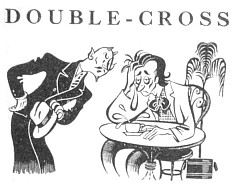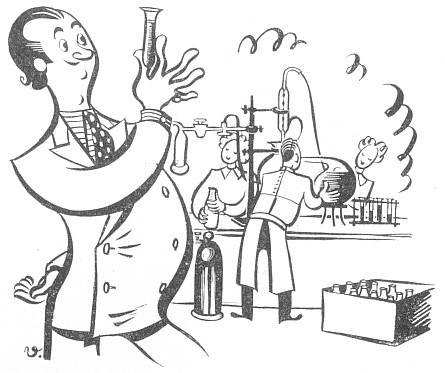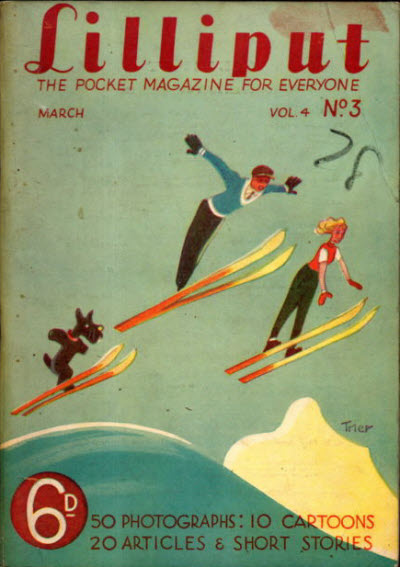
By Frederick Karinthy
The Poet
THE poet settled himself comfortably at the cafe table, drew his cup up close, put in a lump of sugar and began to weep.
He wept nice and evenly, first dropping a tear out of his right eye and then out of his left eye into the cup which he deftly held underneath to catch the drop. When the cup was full, he wiped his eyes with the table-napkin, stirred the fluid in the cup, and began to sip it with relish.
A tall and skinny gentleman sitting at the next table watched the poet attentively. Suddenly he got up and approached Wm.
“My name is John Devil,” he said curtly.
“The devil?” inquired the poet with some curiosity.
“My private affairs have nothing to do with you,” remarked the skinny gentleman coldly. “For the rest, I am a business man and am visiting Budapest on business. What is this you are doing?”
“You saw it, didn’t you? I was lunching, and I might even say,
having tea and dining.”
“And is all this genuine?”
The poet shrugged his shoulders. Mr. Devil raised the cup, smelled it, dipped in a finger and tasted the fluid. He nodded and glanced at his watch. I
“In half an hour I am leaving for Manchester. I dislike long negotiations so I will make you my offer in very few words. You supply me two or three quarts of this fluid per month and I will pay you six hundred dollars per quart. My firm in Manchester will pay the money into your current account each month—in advance. The first instalment will be paid at the beginning of next month. I shall expect delivery from you not later than the fifteenth of that month. Good afternoon.”
John Devil vanished and the poet rubbed his eyes.
“Nonsense!” he exclaimed with irritation.
But on the first of the month, to a day, he received the promised amount. He was beside himself with joy; in his first rapture he
236
LILLIPUT
bought a coat and underwear, took a cosy little flat, laid in coals and started to live.
After a week his conscience smote him. He really ought to send a shipment to John Devil; the final date was approaching fast.
That evening he returned home from his club earlier than usual—he had joined the club quite recently—lit the fire, dined and got into his pyjamas. Then he sat down to his desk, drew up a delicate coffee-cup, put in a lump of sugar and looked up at the ceiling with the idea of getting to work.
He waited for the tears to come,
but when after five minutes nothing had happened, he began to rub his eyes in alarm.
“What's this?” he asked himself with some embarrassment.
But still nothing came.
“Come on!” said the poet nervously, and felt distinctly offended. “How long am I to wait?”
He pulled down the corners of his mouth and began to lament aloud.
“Oh, I am a poor, unfortunate, orphaned, lonely, unhappy, miserable worm,” said the poet, louder and louder. “Oh, I am a pitiable beggar. . . .”

237
LILLIPUT
But it was all in vain. No tears came.
The poet was terrified. If things went on like this he would be unable to fulfil his contract with John Devil, and then good-bye to the comfortable life. He began to rub and massage his eyes in wild despair.
“This is no good,” he said at last. “The old man is not to be deceived, he can see well enough that I am no beggar. I must think up something else.”
After a short rest he began again.
“Oh, poor, unhappy mankind. How much must you suffer! To think of it! Oh, my poor, poor, fellow-men. . . “
Again he waited, but noticed with increasing apprehension that his eyes were getting drier and drier and that the corners of his mouth were beginning to straighten out and even to curve upwards despite all he could do. His heart contracted with fright because he felt that his diaphragm was showing a suspicious fluctuation.
“My poor unfortunate . . . fellow . . . men. . . .”
A cold sweat appeared on his forehead when he realised that his mouth was expanding to a broad grin reaching almost from ear to ear, and that if it went on for another minute he would burst out laughing.
He grew pale. That would be the end. And was he to give up this easy life now that he had tasted it?
He hesitated a moment and then a defiant gleam came into his eye. He got up, put a little water into the tea-kettle, warmed it slightly and poured it into the cup. Then he added a little salt and a pinch of ashes. He mixed it well, put it into a bottle, drove the cork well down and sealed it.
He posted the bottle to the Manchester address and waited for the answer in trepidation. The three quarts were punctually delivered before the fifteenth of the month.
On the first day of the next month, more money arrived without comment. The poet drew a long breath. Then he engaged a secretary, put up a laboratory, and got busy.
Two months later he asked for a rise on the grounds that his raw materials had gone up in price. A new contract was made and the poet enlarged his plant.
Later, he bought the Manchester business from John Devil and himself supplied politicians and princes wholesale with the materials they needed to make statements about the peaceful development and happiness of mankind.
